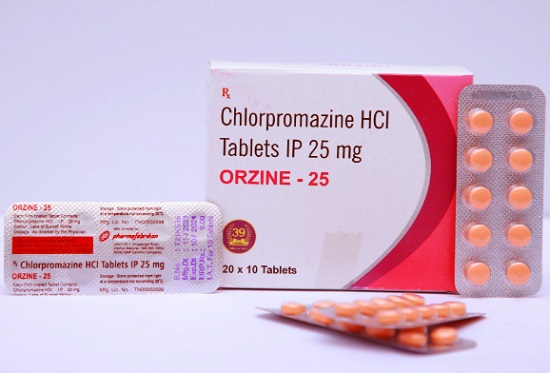Chlorpromazine Found to Inhibit Human Metapneumovirus (HMPV) by Blocking Virus Internalization
Nikhil Prasad Fact checked by:Thailand Medical News Team Jan 05, 2025 4 months, 2 weeks, 3 days, 23 hours, 12 minutes ago
Medical News: Insights into a Revolutionary Study
Human metapneumovirus (HMPV), a virus notorious for causing severe respiratory infections, has met a formidable adversary in chlorpromazine - a medication traditionally used for psychiatric disorders. Researchers from institutions including Vanderbilt University School of Medicine, Emory University School of Medicine, and the University of Pittsburgh School of Medicine collaborated to unravel this groundbreaking discovery.
 Chlorpromazine Found to Inhibit Human Metapneumovirus (HMPV) by Blocking Virus Internalization
Chlorpromazine Found to Inhibit Human Metapneumovirus (HMPV) by Blocking Virus Internalization
This
Medical News report delves into their detailed study, which highlights how chlorpromazine hampers HMPV infectivity by preventing virus internalization. The findings underscore the potential for this drug to inhibit viral fusion and subsequent infection.
HMPV: A Persistent Threat
First identified in 2001, HMPV has become a leading cause of lower respiratory tract infections, especially in infants, children, and immunocompromised individuals. Unlike many viruses in the same family, HMPV displays a unique mechanism for invading host cells. While most paramyxoviruses fuse with cell membranes at the surface, HMPV employs an endosomal route, initiating its fusion process only after internalization into host cells.
This study illuminates how this virus manipulates cellular pathways, such as clathrin-mediated endocytosis and actin polymerization, to infiltrate the bronchial epithelial cells lining the airways. Chlorpromazine, as it turns out, disrupts this very mechanism, significantly impairing the virus’s ability to infect.
Chlorpromazine’s Role Unveiled
Through sophisticated experiments using fluorescence microscopy and chemical inhibitors, researchers demonstrated that chlorpromazine disrupts HMPV entry into cells. Normally, the virus utilizes cellular machinery, including clathrin-coated pits, to internalize itself into host cells. Once inside, it fuses with endosomal membranes to establish infection. Chlorpromazine impairs this pathway by halting the formation of nascent endosomes.
In essence, chlorpromazine not only restricts the virus to the cell surface but also renders it vulnerable to neutralizing antibodies. This dual action effectively blocks the virus’s progression, marking a significant breakthrough in antiviral strategies.
Key Findings
-Internalization Blockage: Chlorpromazine-treated cells exhibited a dramatic reduction in virus internalization, as evidenced by fluorescence assays.
-Fusion Inhibition: The drug delayed viral fusion kinetics and diminished fusion rates. Without internalization, the virus could not effectively interact with host endosomal membranes.
-Reduction in Infectivity: Chlorpromazine reduced HMPV infectivity by nearly 90% in laboratory conditions.
-Unique Mechanism: Unlike viruses that require low pH for fusion, HMPV’s fusion process remains pH-independent. This makes chlorpromazine’s effect particularly noteworthy since it targets a distinct viral entry pathway.
The Broader Implications
These findings are significant, not only for their potential therapeutic applications but also for their contribution to the understanding of HMPV biology. For years, researchers have sought ways to tackle respiratory viruses like HMPV, which lack effective vaccines or specific antiviral treatments.
What makes this discovery even more intriguing is that the study mentions the antiviral potential of chlorpromazine against HMPV only discreetly, emphasizing the need for further exploration and validation in clinical settings.
Future Directions and Conclusions
The study sets the stage for further research into repurposing existing drugs like chlorpromazine for viral infections. With its proven safety profile as a psychiatric medication, chlorpromazine could be fast-tracked for trials against HMPV and possibly other respiratory viruses.
In conclusion, chlorpromazine's ability to hinder HMPV internalization and infection represents a promising avenue for antiviral therapy. By disrupting the virus’s entry mechanism, this drug highlights the untapped potential of targeting early stages of viral infections. The study authors encourage more comprehensive investigations to translate these findings into clinical applications.
The study findings were published in the peer-reviewed journal PLOS Pathogens.
https://journals.plos.org/plospathogens/article?id=10.1371/journal.ppat.1005303
For the latest HMPV News, keep on logging to Thailand
Medical News.
Read Also:
https://www.thailandmedical.news/news/probenecid-shows-promise-against-respiratory-virus-human-metapneumovirus-hmpv
https://www.thailandmedical.news/news/columbia-university-study-finds-that-the-phytochemical-ginkgolic-acid-can-inhibit-human-metapneumovirus-infectivity
https://www.thailandmedical.news/news/the-phytochemical-gamma-fagarine-from-the-root-of-zanthoxylum-bungeanum-is-an-effective-antiviral-against-hmpv
https://www.thailandmedical.news/news/phytochemicals-from-marine-algae-offer-hope-in-combating-hmpv-infections
https://www.thailandmedical.news/news/australian-drug-repurposing-study-uncovers-potential-inhibitors-against-human-metapneumovirus
https://www.thailandmedical.news/articles/hmpv-human-metapneumovirus
